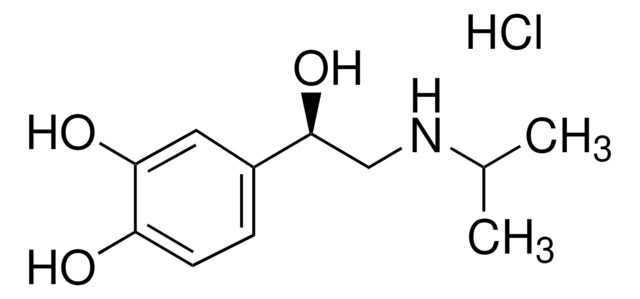P0884
(±)-Propranolol hydrochloride
≥99% (TLC), powder, β-adrenoceptor antagonist
Synonym(s):
(±)-1-Isopropylamino-3-(1-naphthyloxy)-2-propanol hydrochloride, DL-Propranolol hydrochloride
About This Item
Recommended Products
product name
(±)-Propranolol hydrochloride, ≥99% (TLC), powder
Quality Level
Assay
≥99% (TLC)
form
powder
color
white
solubility
ethanol: 10 mg/mL
DMSO: <14.5 mg/mL
H2O: 50 mg/mL
45% (w/v) aq 2-hydroxypropyl-β-cyclodextrin: 8.0 mg/mL
originator
AstraZeneca
storage temp.
2-8°C
SMILES string
Cl.CC(C)NCC(O)COc1cccc2ccccc12
InChI
1S/C16H21NO2.ClH/c1-12(2)17-10-14(18)11-19-16-9-5-7-13-6-3-4-8-15(13)16;/h3-9,12,14,17-18H,10-11H2,1-2H3;1H
InChI key
ZMRUPTIKESYGQW-UHFFFAOYSA-N
Gene Information
human ... ADRB1(153) , ADRB2(154) , ADRB3(155) , HTR1A(3350) , HTR1B(3351) , HTR1D(3352) , HTR1E(3354) , HTR1F(3355) , HTR2A(3356) , HTR2B(3357) , HTR2C(3358)
Looking for similar products? Visit Product Comparison Guide
General description
Application
- to determine whether autonomic nervous system mediated the promotive effect on skin microcirculation in rat
- as a non-selective β- receptor blocker to reduce the arrhythmogenic events
- to study its effect on oxygen-induced retinopathy in mice
Biochem/physiol Actions
Features and Benefits
Caution
Signal Word
Warning
Hazard Statements
Precautionary Statements
Hazard Classifications
Acute Tox. 4 Oral
Storage Class Code
11 - Combustible Solids
WGK
WGK 3
Flash Point(F)
Not applicable
Flash Point(C)
Not applicable
Personal Protective Equipment
Certificates of Analysis (COA)
Search for Certificates of Analysis (COA) by entering the products Lot/Batch Number. Lot and Batch Numbers can be found on a product’s label following the words ‘Lot’ or ‘Batch’.
Already Own This Product?
Find documentation for the products that you have recently purchased in the Document Library.
Customers Also Viewed
Articles
DISCOVER Bioactive Small Molecules for Neuroscience
DISCOVER Bioactive Small Molecules for Neuroscience
DISCOVER Bioactive Small Molecules for Neuroscience
DISCOVER Bioactive Small Molecules for Neuroscience
Chromatograms
application for SFCapplication for HPLCapplication for HPLCOur team of scientists has experience in all areas of research including Life Science, Material Science, Chemical Synthesis, Chromatography, Analytical and many others.
Contact Technical Service










